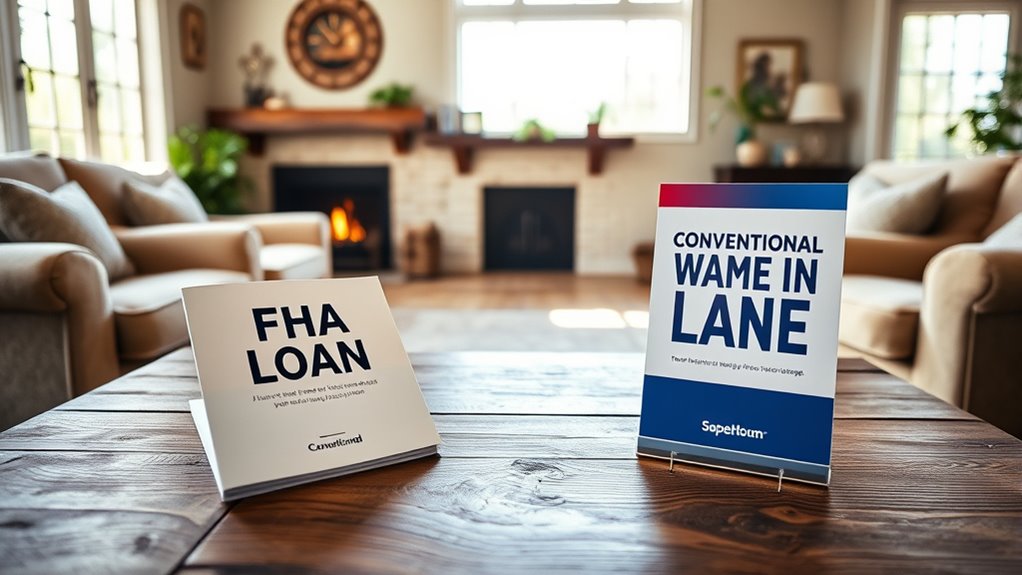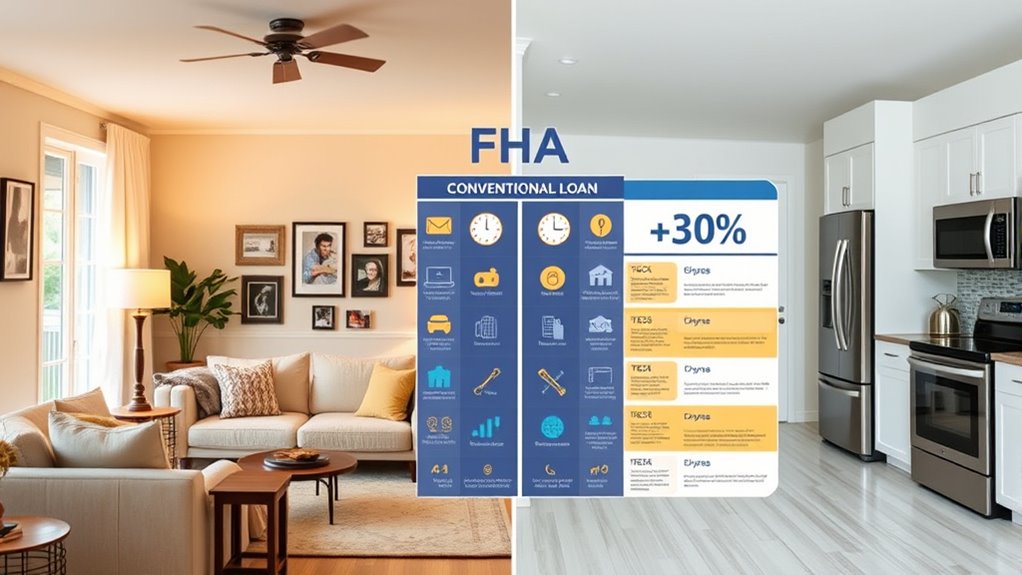FHA loans are backed by the government and require lower credit scores and smaller down payments, making them ideal if you have less savings or weaker credit. Conventional loans aren’t government-backed and typically need higher credit scores and larger savings, but they often have lower mortgage insurance costs. Understanding your finances can help determine which option suits you best. Keep exploring, and you’ll discover more about how each loan type can fit your homeownership goals.
Key Takeaways
- FHA loans are government-backed with flexible credit and down payment options, ideal for buyers with weaker credit or limited savings.
- Conventional loans require higher credit scores and larger down payments but often have lower long-term mortgage insurance costs.
- FHA loans mandate mortgage insurance premiums for the life of the loan, while PMI on conventional loans can be canceled after 20% equity.
- FHA’s higher debt-to-income limits enable more borrowers with existing debt to qualify than conventional loans.
- Conventional loans generally offer more favorable terms for buyers with strong credit and larger savings, reducing overall costs.

When choosing between FHA and conventional loans, understanding their key differences can help you make an informed decision. FHA loans are backed by the Federal Housing Administration, meaning the government insures the loan, which encourages lenders to approve borrowers with less-than-perfect credit or limited savings. Conventional loans, on the other hand, are not backed by the government and rely solely on private lenders, often requiring stronger financial credentials.
If you’re a first-time buyer or have a lower credit score, FHA loans are designed to be more accessible. They typically accept credit scores as low as 500 with a 10% down payment or 580 with just 3.5%. Conventional loans usually require a minimum credit score of around 620, making them less forgiving for those with weaker credit histories. Your credit score directly impacts your interest rate; higher scores generally mean lower rates, saving you money over the life of the loan. FHA’s flexibility with credit can help you get approved even if your credit isn’t perfect, but keep in mind that a higher credit score will still benefit you with better terms.
Down payments also differ between the two. FHA loans require a minimum of 3.5% if your credit score is 580 or higher, but if your score is lower, you’ll need to put down at least 10%. Conventional loans can require as little as 3%, but putting down more often results in better interest rates and can reduce mortgage insurance costs. FHA’s lower down payment options make it easier for those with limited savings to buy a home, while conventional loans offer more flexibility if you have saved more money.
Mortgage insurance costs also vary. FHA loans require mortgage insurance premiums (MIP) for the life of the loan, which can add to your monthly payments and long-term costs. Conventional loans, when the down payment is less than 20%, require private mortgage insurance (PMI). However, PMI can be canceled once you’ve built up 20% equity, giving you more control over your costs. FHA’s mortgage insurance tends to be more expensive over time, but its approval criteria are more lenient. Lenders often view FHA loans as less risky due to government backing, which can influence approval and pricing. Additionally, FHA loans may have more flexible requirements regarding debt-to-income ratios, enabling more borrowers to qualify.
Interest rates and fees depend on your credit, market conditions, and lender policies. FHA rates can be slightly lower or higher than conventional rates depending on your circumstances, and both loans involve closing costs. Conventional loans tend to have lower overall costs for borrowers with good credit, but they might be less accessible for those with lower scores or limited savings.
Finally, the debt-to-income ratio (DTI) plays a role. FHA allows DTI up to 43%, sometimes higher with compensating factors, making it easier for borrowers with more debt. Conventional loans typically accept DTIs up to 45%, but approval depends on your overall financial picture. Knowing these differences helps you choose the loan that best aligns with your financial situation and homeownership goals.
Frequently Asked Questions
Can I Switch From an FHA to a Conventional Loan Later?
Yes, you can switch from an FHA to a conventional loan later. You’ll need to qualify based on your current financial situation, and your home must meet certain criteria. Typically, you’ll go through a new application process, including credit checks and appraisal. Keep in mind, refinancing may involve closing costs and fees, but it can help you get better loan terms or lower your monthly payments over time.
What Are the Hidden Costs Associated With Each Loan Type?
You should know that FHA loans often have upfront mortgage insurance premiums and ongoing monthly fees that can add up. Conventional loans may require private mortgage insurance (PMI) if your down payment is less than 20%, which also increases costs. Additionally, FHA loans might have stricter appraisal requirements, while closing costs can vary between both types. Always review these hidden fees to understand the full financial picture before committing.
How Do Credit Scores Impact Loan Approval Differently?
Think of your credit score like a key uncovering different doors. A higher score, say above 740, can open the door to better interest rates and more loan options. If your score is lower, you might still qualify but could face higher rates or stricter approval criteria. I once helped a client with a 620 score, and we navigated a more limited loan choice, showing how credit scores directly shape your homebuying path.
Are There Specific Property Types Better Suited for FHA or Conventional Loans?
You’ll find that FHA loans are ideal for properties like condos, townhomes, or single-family homes in good condition, especially if you have a lower credit score or limited down payment. Conventional loans suit more diverse property types, including multi-unit buildings, fixer-uppers, or homes in established neighborhoods. Keep in mind, some property types may require specific inspections or appraisals, so check with your lender to find the best fit.
What Are the Long-Term Financial Implications of Choosing Each Loan?
Choosing an FHA or conventional loan impacts your finances long-term. With an FHA loan, you might face higher mortgage insurance costs, which can add up over time, but it helps you qualify easier. Conventional loans often have lower overall costs once you build equity, but require higher credit scores and larger down payments. Think about your future plans and financial stability to determine which option aligns best with your goals.
Conclusion
Choosing between FHA and conventional loans depends on your unique situation. Did you know that nearly 60% of first-time homebuyers opt for FHA loans due to lower down payments? Whatever route you take, understanding your options can make a huge difference in achieving your homeownership dreams. Remember, with the right guidance and knowledge, you’re closer than you think to turning your homeownership goals into reality. Stay informed, stay confident, and take that next step!









